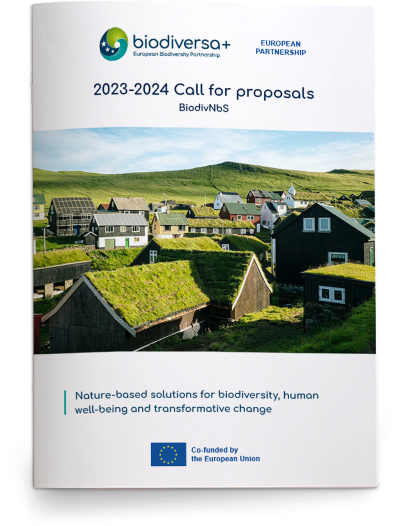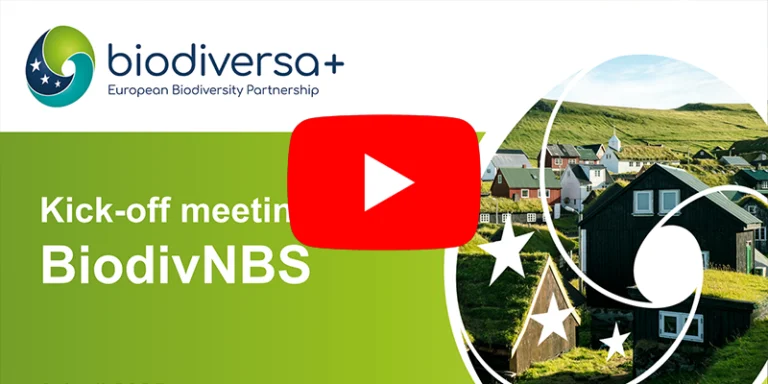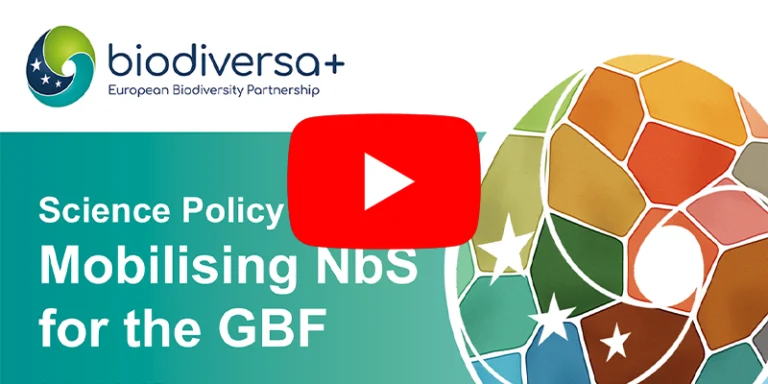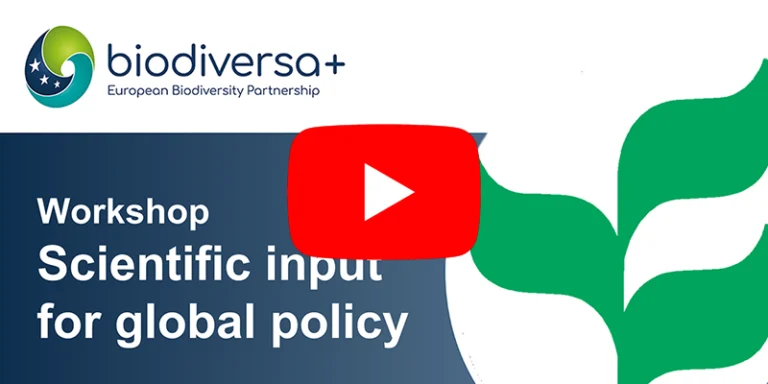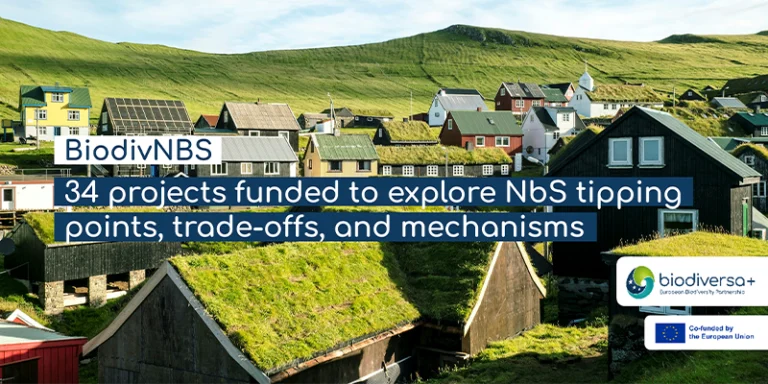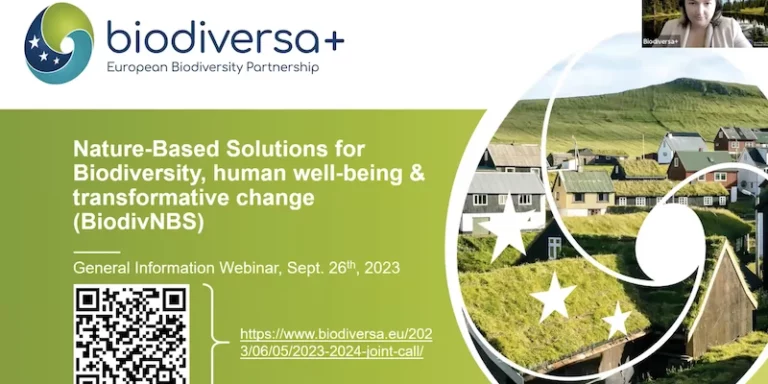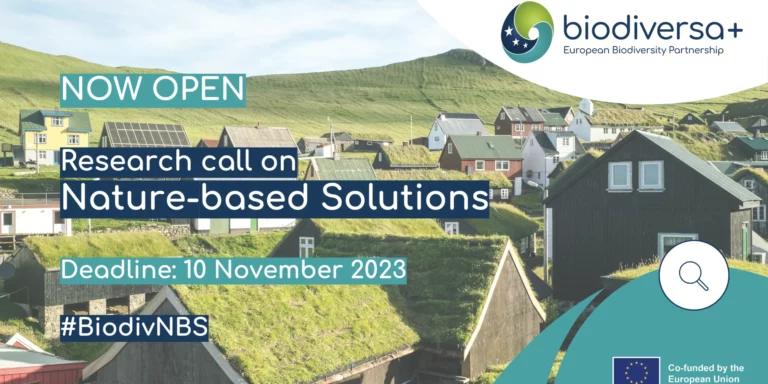Quick access:
Presentation | Funded projects | Evaluation Committee | Funding Organisations | News & Events
2023-2024 Joint Call
“Nature-based solutions for biodiversity, human well-being and transformative change”
In September 2023, Biodiversa+ launched its BiodivNBS call, inviting proposals for three-year research projects to explore the tipping points, trade-offs, and mechanisms influencing Nature-based Solutions (NbS) and their effective implementation.
This call, co-funded by the European Commission, focused on three (non-exclusive) key themes:
- THEME A: Synergies and trade-offs of Nature-based Solutions in the context of human well-being
- THEME B: Nature-based Solutions mitigating anthropogenic drivers of biodiversity loss
- THEME C: The contribution of Nature-based Solutions for just transformative change
The call attracted a remarkable response, with 183 pre-proposals and 108 eligible full proposals received. An independent Evaluation Committee rigorously assessed these submissions and carefully ranked the projects. The Call Steering Committee, made up of all the participating funding organisations, then selected 34 research projects for funding in strict accordance with the rankings. These projects demonstrate academic excellence while addressing pressing scientific and societal challenges. They foster collaboration across different disciplines and involve a wide range of stakeholders.
This decision represents a substantial financial commitment of over €40 million, including contributions from the European Commission.

- AirBiD – Airborne biological diversity shaped and modelled by Urban Green Elements (PT, SE, AT, DK, IT)
- ARE BEST NbS – Aquatic and Riparian Ecosystems: Biodiversity and Economic Service Transformations from NbS (PT, DK, HU, NL, NO)
- BIOCUE – Microbial biodiversity and Carbon Use Efficiency as Nature Based Solution for soil C stabilization (ES, ZA, DK, CH)
- BIODIVECITY – Greening cities as nature-based solution and their impact on vectors and vector-borne disease risks (ES, FR, MA, NL)
- Biodiversity2Drugs – Peptide Biodiversity: Advancing Human Health Through Nature’s Pharmacological Treasures (ES, FR, BR, PT, SE, CA, AT, BE, DK, IT, NL, NO, CH)
- BioPlastOmics – Discovering Brazilian Biodiversity-Driven Plastic Degradation through Omics Analysis (ES, FR, BR)
- BioReStorm – Anticipating Biological Succession in Rehabilitation of Long-Term Operated Nature-Based Solutions for Stormwater Treatment in Different Climate Zones (FR, EE, SE, CA)
- BioSolar – Solar farms: an opportunity to recover biodiversity in farmlands (ES, PT, SE, CA, SI, PL, HU, IS)
- BRAVE – Biological Invasions Resolved through Adaptable, Versatile, and Engaging Nature-Based Solutions (PT, SE, DK, IT, NO,)
- COMCHA – Community-based change: local and traditional knowledges in NBS (ES, BR, PT, IT, HU, IS)
- DEFENDBIO – Biosphere defenders leveraging legal and governance tools for just sustainability transformations (SE, BE, DK, NL, CH)
- emBrace – Reconciling Food Systems Sustainability and Biodiversity Conservation in Multifunctional Protected Areas (ES, SE, BE, NL)
- EVESNAT – Nature-based Solutions to meet EU Nature Restoration Targets: Evaluating synergies and trade-offs across Ecosystem Services for biodiversity conservation, climate change mitigation, and resilience and autonomy improvement (FR, IT, AT, CH)
- FairNature – Developing NbS scaling approaches to achieve just transformative change (ES, FR, BE, DK, HU, NL)
- FITNESS – Financing Transformative Nature-based Solutions for Equitable and just Sustainability Solutions (BR, BE, DK, NO)
- FOUNDATIONAL – transFOrming rUral laNDscapes And communiTIes thrOugh NAture-based soLutions: integrating biodiversity conservation and human well-being at the nature-agriculture interphase (FR, BR, ZA, NL)
- FreeB – Studying FREE-living honey Bee colonies in Europe: nature-based solutions to safeguard diversity, ensure resilience, and promote transformative change in beekeeping (FR, IE, PT, SE, PL)
- GREENHANCEnbt – Growing Resilience by Exploring Methods to Enhance Urban Agriculture for Human Well-being, Community and Biodiversity Enrichment (ES, SE, IT)
- inSALSA – Increasing Sustainability of Agribiologicals by Living Labs in sub-Saharan Africa (ZA, SE, DK, IT, IS, CZ)
- NATUREBIOPROMO – Hybrid NATURE-Based Solutions as BIOdiversity PROMOters and Their Implications for Emerging Contaminants Mitigation (FR, BR, ZA, PT, IT, CZ)
- NatureScape – Enhancing Urban Sustainability for Environmental Quality and Human Well-being through Nature-Based Solutions Transformation Labs (IE, PT, LV, IT, PL, NO, CH)
- NBS4AQUAMISSION – Nature Based Systems Mission for Aquatic Biodiversity Enhancement: Reducing Pharmaceutical Products Pollution in Urban and Rural Environments (ES, IE, DK, IT, NO, TR)
- NBSPLUS – NBS Services Promoting Local Biodiversity, Well-being and Scalable Solutions (ES, EE, PT, SE, CA, NO)
- PHlorestAll – Planetary Health by Healing Forests as Nature Based Solution (PT, LT, SI, PL, TW)
- PRESINMED – Preserving the singularity of Mediterranean high-mountain biodiversity hotspots: a NBS approach (ES, PT, MA, IT)
- RESOLVE – NatuRE based SOLutions for sustainable use of high north marine biodiVersity and ecosystems sErvices (SE, DK, IS, NO)
- RiVIVE – River Conviviality: Advancing socio-environmentally just river restoration through nature based solutions (ES, FR, IT, NL)
- SaltyBEATS – Salty symphonies: bringing back BiodivErsity in mArginal Saltlands (ES, PT, TN, IT, PL, NL)
- SOILDIVINE – Promoting Soil Quality and Biodiversity in Vineyard Ecosystems Through Nature-Based Solutions (ES, PT, IT, SI)
- SUNLOOP – Spontaneous Urban Nature and LOcal nO net land take Policies (FR, BE, CH)
- TRANSFOrm – Back to the future: Traditional agroforestry systems as NbS to face multiple societal challenges (ES, IT, PT, AT, LT, IL)
- UrbanBEE – Promoting Biodiversity, Ecosystem Services and Societal Engagement Across Diverse Urban Ecosystems (ZA, AT, IT, HU)
- WildCrop – Optimal rewilding of crop-bodyguard interactions facilitating the green transformation of agriculture (ES, SE, IT)
- Wilding Grasslands (Living Grasslands) – Wilding as nature-based opportunity for grassy ecosystems under diverse land tenure systems (ZA, SE, NL)
- Scientific co-Chair: Rachel Bezner-Kerr
- Policy-management co-Chair: Claire Brown
Scientific panel (27)
- Kofi Akamani
- Isabelle Aubin*
- Jacob Carstensen*
- Yu-Chung Chiang
- Michael Christie
- Thomas Elmqvist
- Michael Fullen
- Christopher Gore*
- Jan Hanspach
- Stephen Hawkins
- Iryna Herzon**
- Sven Jelaska
- Hans Keune
- Carolyn Lundquist
- Eric Malezieux**
- Frank Matose
- Liam McCarton
- Masoumeh Mirsafa
- Unai Pascual
- Céline Pelosi*
- Tavis Potts
- Leonard Sandin
- Bill Slee
- Stephen Swearer**
- Silvia Tobias
- Vigdis Vandvik*
- Erich Wolff
Policy-management panel (26)
- Ana Cristina Becerra Salas
- Alison Blay-Palmer*
- Karma Bouazza*
- Roberto Crosti**
- Andrew Farmer
- Judith Fisher
- Adriana Ford*
- Sonja Gantioler
- Cecilia Gonçalves Simões
- Juan Carlos Gonzalez
- Robert (Bob) Harris
- Ana Maria Hernandez Salgar**
- Katia Hueso
- Valerie Kapos
- Dave Kendal
- Manuel Lago
- Juana Lucia Marino de Posada
- Ivone Pereira Martins
- Vinod Bihari Mathur
- Isabel Mesquita
- Madeleine Nyman
- Christian Prip
- Osamu Saito**
- Elisabeth Simelton*
- Nadia Sitas*
- Janice Weatherley-Singh
* Only step 1
** Only step 2
In total, 41 funding organisations from 34 countries participated to this Call.
The General contact point for the follow-up of the funded projects are Matěj Štěpánek (matej.stepanek@tacr.cz) and Ondřej Kusbach (ondrej.kusbach@tacr.cz), from TA CR (Czech Republic).
| Country | Funding organisation | Acronym | Name | |
| Austria | Fonds zur Förderung der wissenschaftlichen Forschung | FWF | Anna Dickermann | Anna.dickermann@fwf.ac.at |
| Belgium | Belgian Science Policy Office | BELSPO | Aline van der Werf | aline.vanderwerf@belspo.be |
| Belgium (Wallonia-Brussels) | Fonds de la Recherche Scientifique – FNRS | F.R.S-FNRS | Joël Groeneveld | international@frs-fnrs.be |
| Belgium (Flanders) | Fonds Voor Wetenschappelijk Onderzoek-Vlaanderen | FWO | Toon Monbaliu Kristien Peeters |
europe@fwo.be |
| Brazil | Brazilian National Council for Scientific and Technological Development | CNPq | Dileine Amaral da Cunha | dileine.cunha@cnpq.br |
| Brazil | Brazilian National Council of State Funding Agencies | CONFAP | Elisa Natola | elisa.confap@gmail.com |
| Bulgaria | Bulgarian National Science Fund | *BNSF | Milena Aleksandrova
|
aleksandrova@mon.bg
|
| Canada (Québec) | Fonds de Recherche du Québec | FRQNT | Leslie Walsh | Lesliemarie.walsh@frq.gouv.qc.ca
|
| Czech Republic | Technology Agency of the Czech Republic | TA CR | Ondřej Kusbach | ondrej.kusbach@tacr.cz |
| Denmark | Innovationsfonden Denmark | IFD | Aila Lonka
Thorbjørn Moth Gilberg |
aila.lonka@innofond.dk |
| Estonia | Sihtasutus Eesti Teadusagentuur | ETAG | Margit Suuroja | margit.suuroja@etag.ee
|
| Faroe Islands (the) | Research Council Faroe Islands | *RCFI | Maria Húsgarð
Annika Sølvará |
maria@gransking.fo annika@gransking.fo |
| France | Agence Nationale de la Recherche | ANR | Clara Superbie | Biodiversa.cs@agencerecherche.fr |
| Georgia | Ministry of Environmental Protection and Agriculture of Georgia | *MEPA | Carl Amirgulashvili
Liana Giorgadze |
karlo.amirgulashvili@mepa.gov.ge |
| Hungary | Nemzeti Kutatási, Fejlesztési és Innovációs Hivatal | NKFIH | Drorttya Szemere | szemere.dorottya@nkfih.gov.hu |
| Iceland | Icelandic Centre for Research | Rannis | Aegir Thorsson | aegir.t.thorsson@rannis.is
|
| Ireland | Environmental Protection Agency | EPA | Caroline Wynne | c.wynne@epa.ie |
| Israel | Ministry of Environmental Protection | MoEP | Orna Matzner | orna@sviva.gov.il
|
| Italy | Ministry of Universities and Research | MUR | Yasmine Iollo
Aldo Covello |
yasmine.iollo@est.mur.gov.it |
| Italy (Bolazno) | Autonomous Province of Bolzano / Bozen | BOZEN | Laura Cherchi | Laura.Cherchi@provincia.bz.it |
| Latvia | Latvijas Zinātnes Padome | LZP | Maija Bundule | maija.bundule@lzp.gov.lv |
| Lithuania | Lietuvos Mokslo Taryba | LMT | Viktoras Mongirdas | viktoras.mongirdas@lmt.lt
|
| Moldova (the Republic of) | National Agency for Research and Development | *NARD | Aurelia Hanganu | aureliahanganu@yahoo.com
|
| Morocco | Ministère de l’Enseignement Supérieur, de la Recherche Scientifique et de l’Innovation | MESRSI | Abdelouahid Ezzarfi Anas Chokairi Jihane Benarafa |
a.ezzarfi@yahoo.fr chokairi.anas@gmail.com jbenarafadrsi@gmail.com |
| Netherlands (the) | Dutch Research Council | NWO | Floor Hugenholtz | f.hugenholtz@nwo.nl |
| Norway | The Research Council of Norway | RCN | Jonas Enge | jen@forskningsradet.no
|
| Poland | Narodowe Centrum Nauki | NCN | Mateusz Sobczyk Anna Kotarba |
mateusz.Sobczyk@ncn.gov.pl anna.kotarba@ncn.gov.pl |
| Portugal | Fundação para a Ciência e a Tecnologia | FTC | Joana Pinheiro Pedro Ferreira |
joana.pinheiro@fct.pt pedromiguel.ferreira@fct.pt |
| Portugal (Azores) | Fundo Regional da Ciência e Tecnologia | FRCT | Carolina Parelho | carolina.pf.parelho@azores.gov.pt |
| Romania | Unitatea Executivă pentru Finanțarea Învățământului Superior, a Cercetării, Dezvoltării și Inovării | *UEFISCDI | Adrian Asanica Luciana Bratu Andreea Popa |
adrian.asanica@uefiscdi.ro luciana.bratu@uefiscdi.ro andreea.popa@uefiscdi.ro |
| Slovakia | Slovak Academy of Sciences | *SAS | Zuzana Panisová
Silvia Kecerová |
panisova@up.upsav.sk |
| Slovenia | Ministry of Higher Education, Science and Innovation | MVZI | Katja Žagar
|
katja.zagar02@gov.si |
| South Africa | Department of Science and Innovation | DSI | Tugela Matubatuba
Karabo Mphogo |
Tugela.Matubatuba@dst.gov.za |
| Spain | Agencia Estatal de Investigación | AEI
|
Esther Chacón | era-medioambiente@aei.gob.es |
| Spain | Fundación Biodiversidad | FB | Raquel Sancho Rovira | biodiversa@fundacion-biodiversidad.es |
| Spain | Centro para el Desarrollo Tecnológico y la Innovación | CDTI | Marina Sopeña | partenariadoshe@cdti.es |
| Sweden | Swedish Research Council for Environment, Agricultural Sciences and Spatial Planning | Formas | Elin Weyler | elin.weyler@formas.se |
| Switzerland | Swiss National Science Foundation | SNSF | Claudia Ellenrieder
|
biodiversa@snf.ch
|
| Taiwan | National Science and Technology Council | NSTC | Ching-Mei Tang
|
cmtom@nstc.gov.tw
|
| Tunisia | Ministry of Higher Education and Scientific Research | MHESR | Hayet Souai
Saida Rafrafi |
souaihayet@gmail.com
|
| Türkiye | The Scientific and Technological Research Council of Türkiye | TÜBITAK | Yeliz Tümbilen Özer
|
yeliz.ozer@tubitak.gov.tr |
*Not funding research partner
